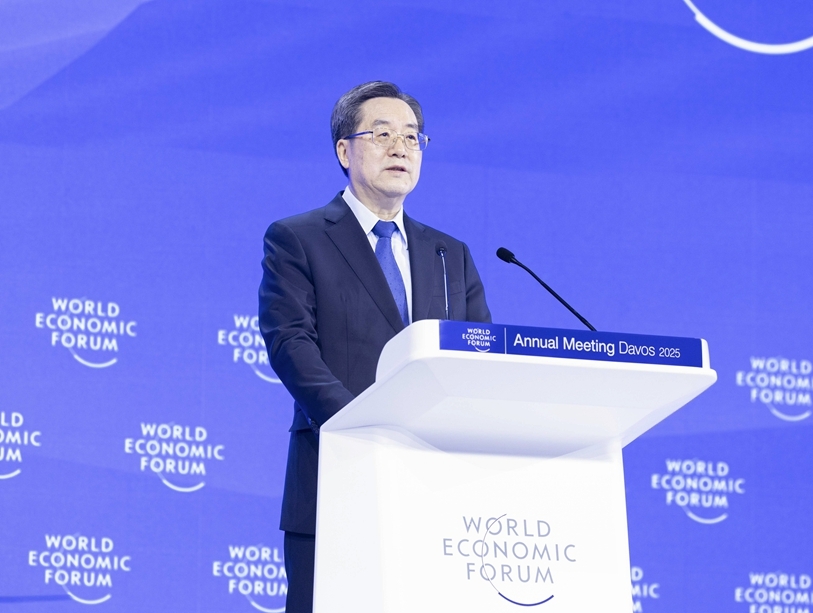
Chinese Vice-Premier Ding Xuexiang on Tuesday delivered a special address at the World Economic Forum Annual Meeting 2025 in Davos, Switzerland. [Photo/Xinhua]
In his address to the World Economic Forum Virtual Event of the Davos Agenda in 2021, Chinese President Xi Jinping pointed out that the problems facing the world are intricate and complex, and that no country can solve them alone or just to their own advantage. There must be global action, a global response and global cooperation, he stressed. A cold war, hot war, trade war or tech war, antagonism and confrontation are misguided approaches that eventually hurt all countries' interests and undermine everyone's well-being. It is only by upholding multilateralism that the problems can be overcome.
It is consultation and cooperation that are needed, the top Chinese leader stressed, rather than a narrow-minded, zero-sum game mentality. It serves no one's interest to reverse globalization and seek seclusion and decoupling. The experience of the past four years shows that so long as countries pool their wisdom and strengths, and pursue inclusive cooperation to find win-win and all-win solutions, economic globalization remains a historical trend that cannot be reversed, despite the headwinds and setbacks.
In his speech at the World Economic Forum Annual Meeting in Davos, Switzerland, on Tuesday, Vice-Premier Ding Xuexiang highlighted the constancy of China's commitment to multilateralism by recalling a similar message that President Xi delivered to the same event eight years ago.
Citing Xi's words that "pursuing protectionism is like locking oneself in a dark room. While wind and rain may be kept outside, that dark room will also block light and air", Ding reminded his audience that "protectionism leads nowhere. A trade war has no winners".
Such a reminder is once again pertinent as there is still, as Ding said, "an ongoing tug of war between the forces for and against economic globalization", with a newly installed US administration set to double down on the country's looking-after-number-one approach to world affairs.
Given its staunch pro-globalization stance and unshakable commitment to multilateralism, it is natural that participants at the Davos meeting should turn their eyes to China to see what it proposes to do.
One of the solutions that China provides for growth, as Ding pointed out, is green development, something that is apposite in the circumstances, with the US putting its own short-term gain before the common good by once again withdrawing from the global climate pact.
Over the past year, the Chinese economy has made steady progress while maintaining overall stability, with the country's GDP growing by 5 percent. A major driving force of its growth is the green economy, which Ding described as "a salient feature of the Chinese economy".
He pledged that the country will make "tireless efforts" to reduce carbon emissions and mitigate pollution and "accelerate the comprehensive transition to green economic and social development".
China boasts the world's largest and most complete new energy industry chain and the country now produces 90 percent of the world's solar panels and 70 percent of its electric vehicle batteries. It has served as a strong booster for global green development and climate response. It is no exaggeration to say that in much of the world, the green transition is powered by "made in China".
Yet despite this, Chinese companies are facing increasing protectionist policies as they expand overseas. For example, the US quadrupled tariffs on Chinese electric vehicles last year to 100 percent, and the European Union has also conducted a raft of probes targeting "State subsidies" in China's green tech sector, as well as imposing punitive tariffs on Chinese-made EVs, prompting Ding to warn against "erecting green barriers that could disrupt normal economic and trade cooperation".
It is encouraging that European Commission President Ursula von der Leyen said in Davos that Europe "must engage constructively with China to find solutions in our mutual interest". After all, the need for the world to unite and work together to address global climate challenges has never been more urgent, with last year continuing the trend of being the hottest year on record.
Economic globalization is, as Ding remarked, not a "you-lose-I-win zero-sum game", but a universally beneficial process where all can benefit and win together so long as any tensions and disagreements that appear are resolved through dialogue and consultation.
China firmly believes that communication and coordination will not only make the pie of economic globalization bigger, but also distribute it better.